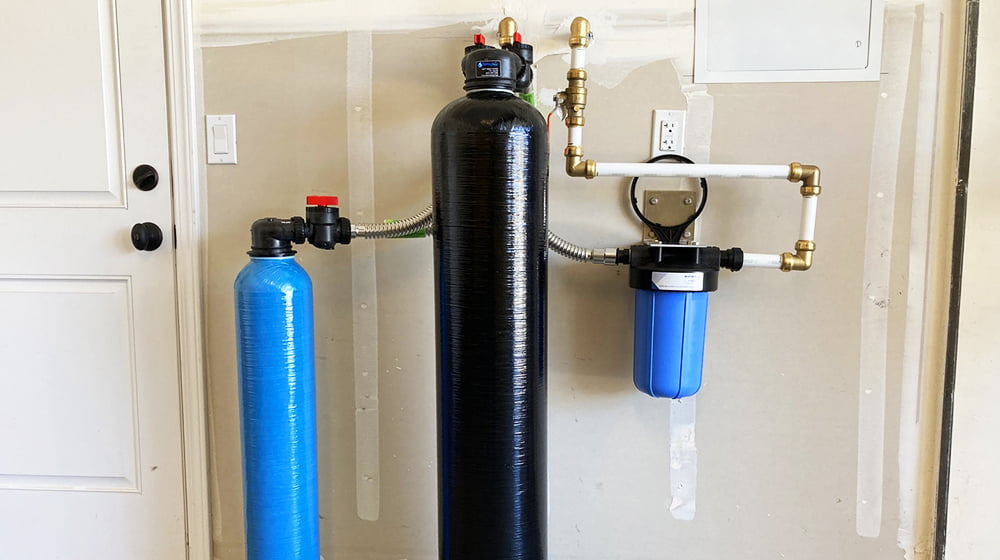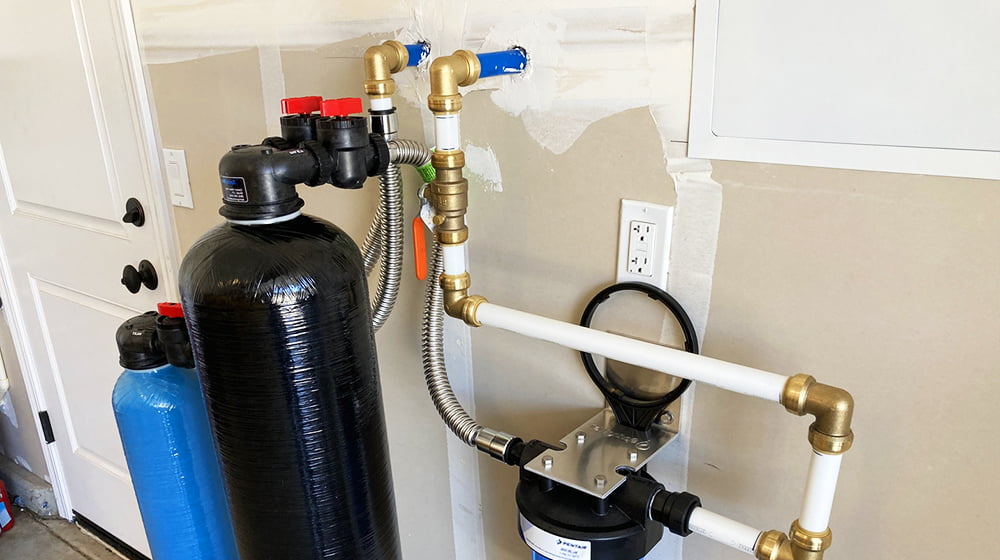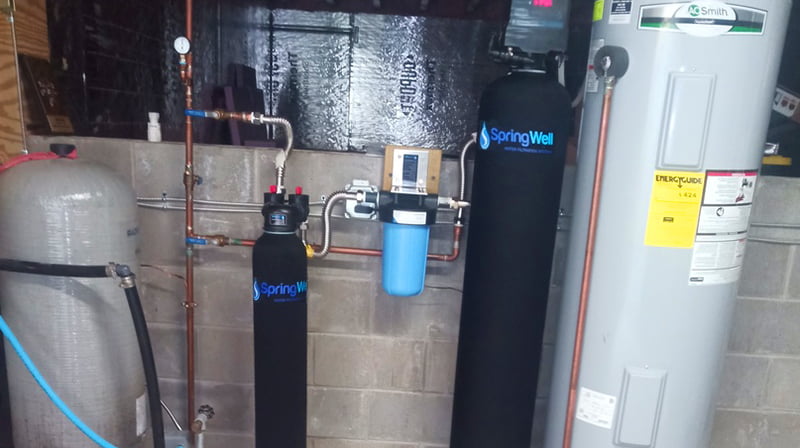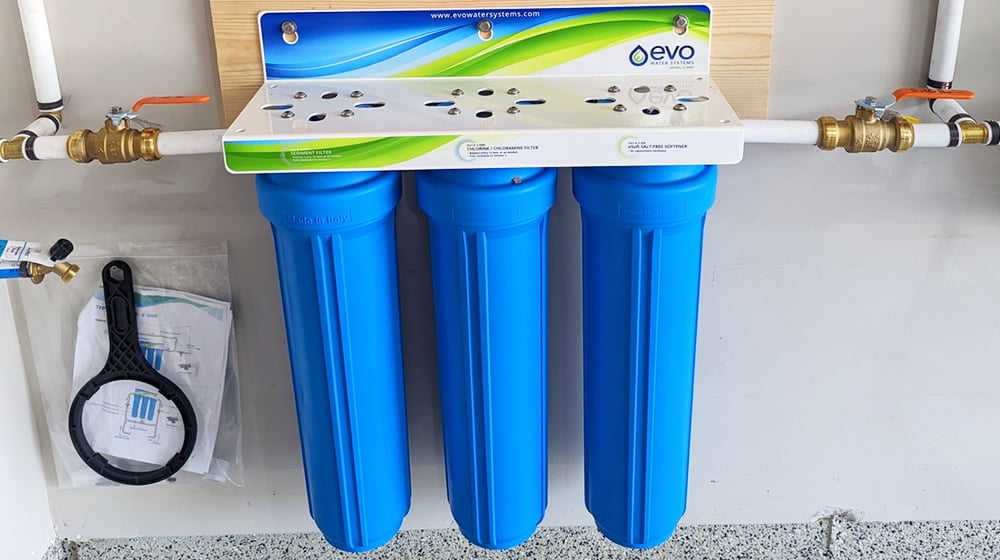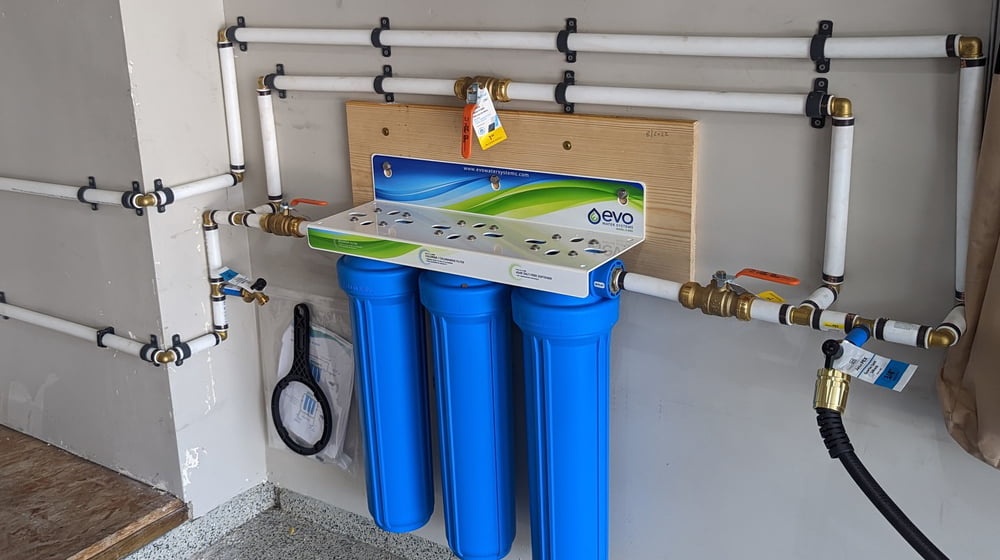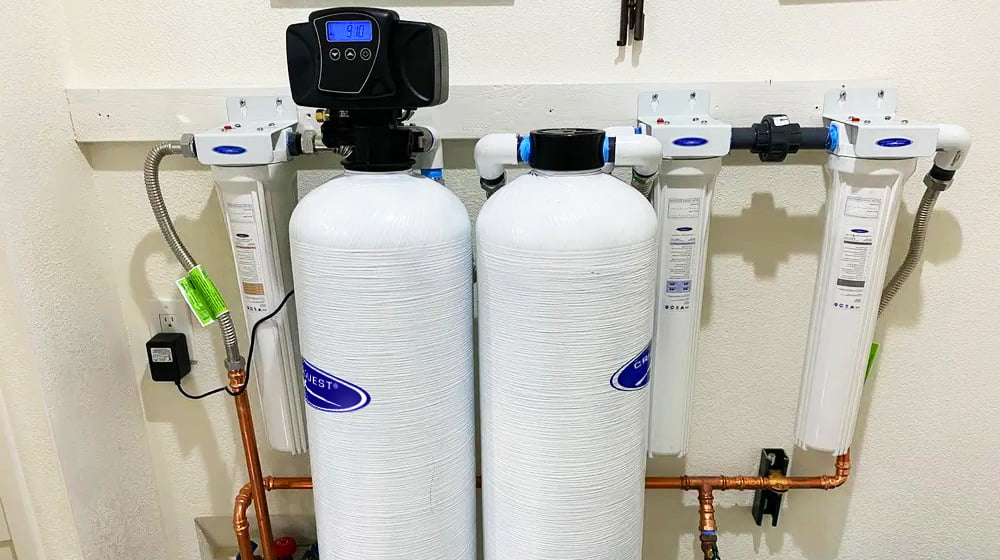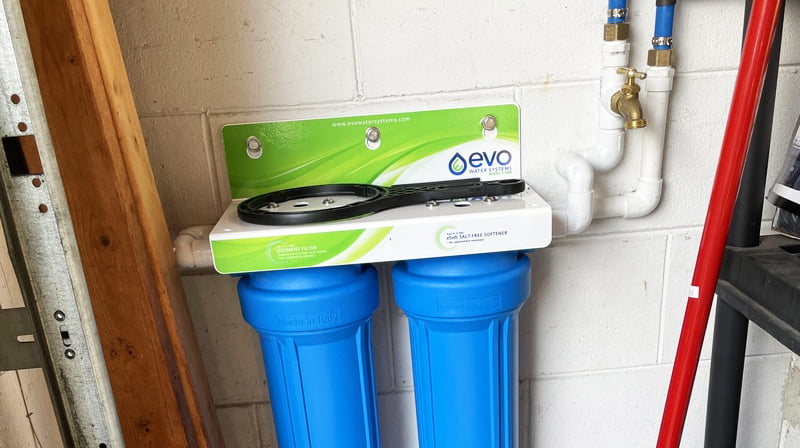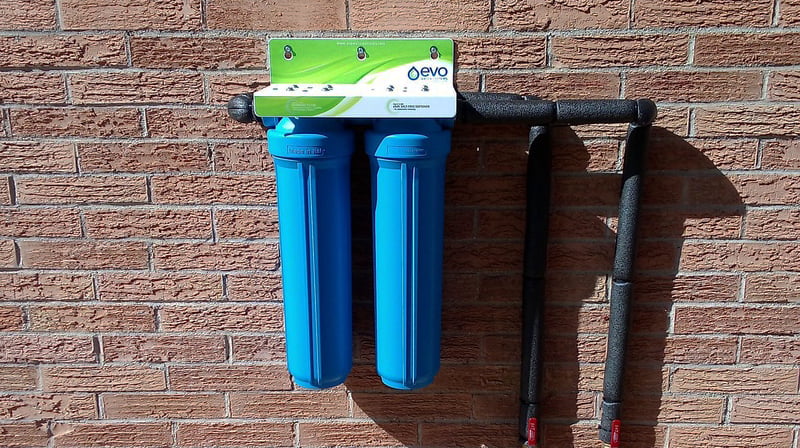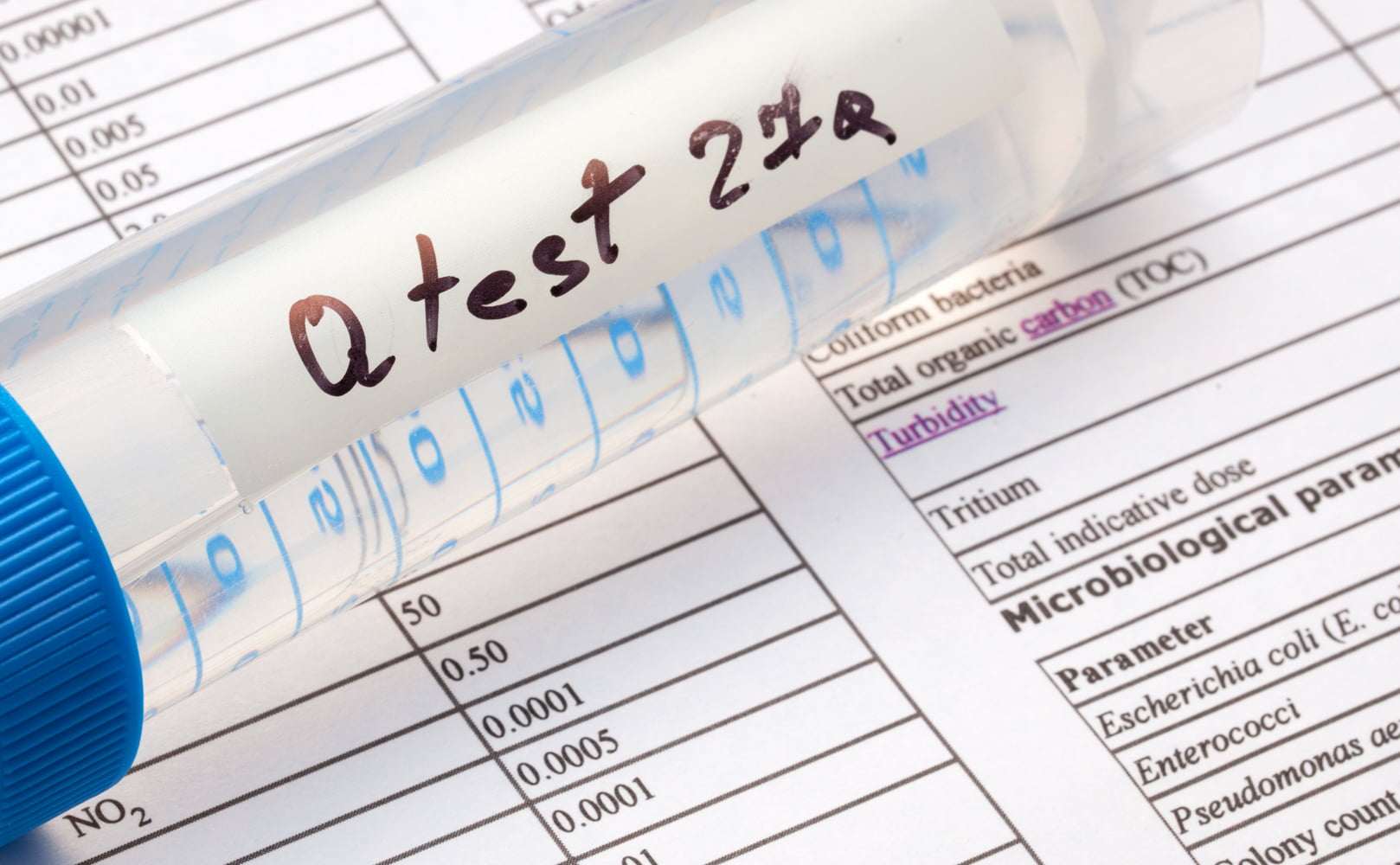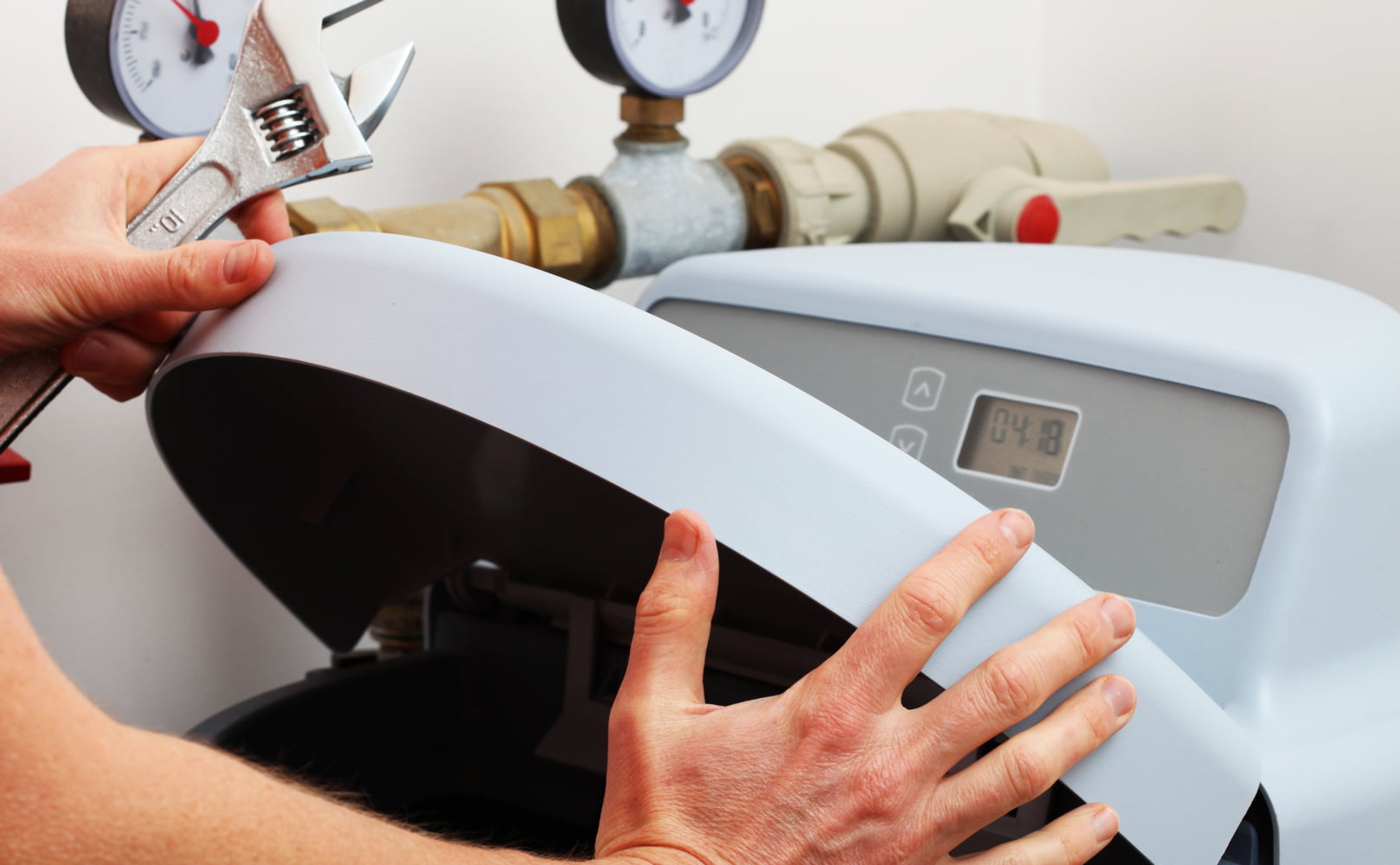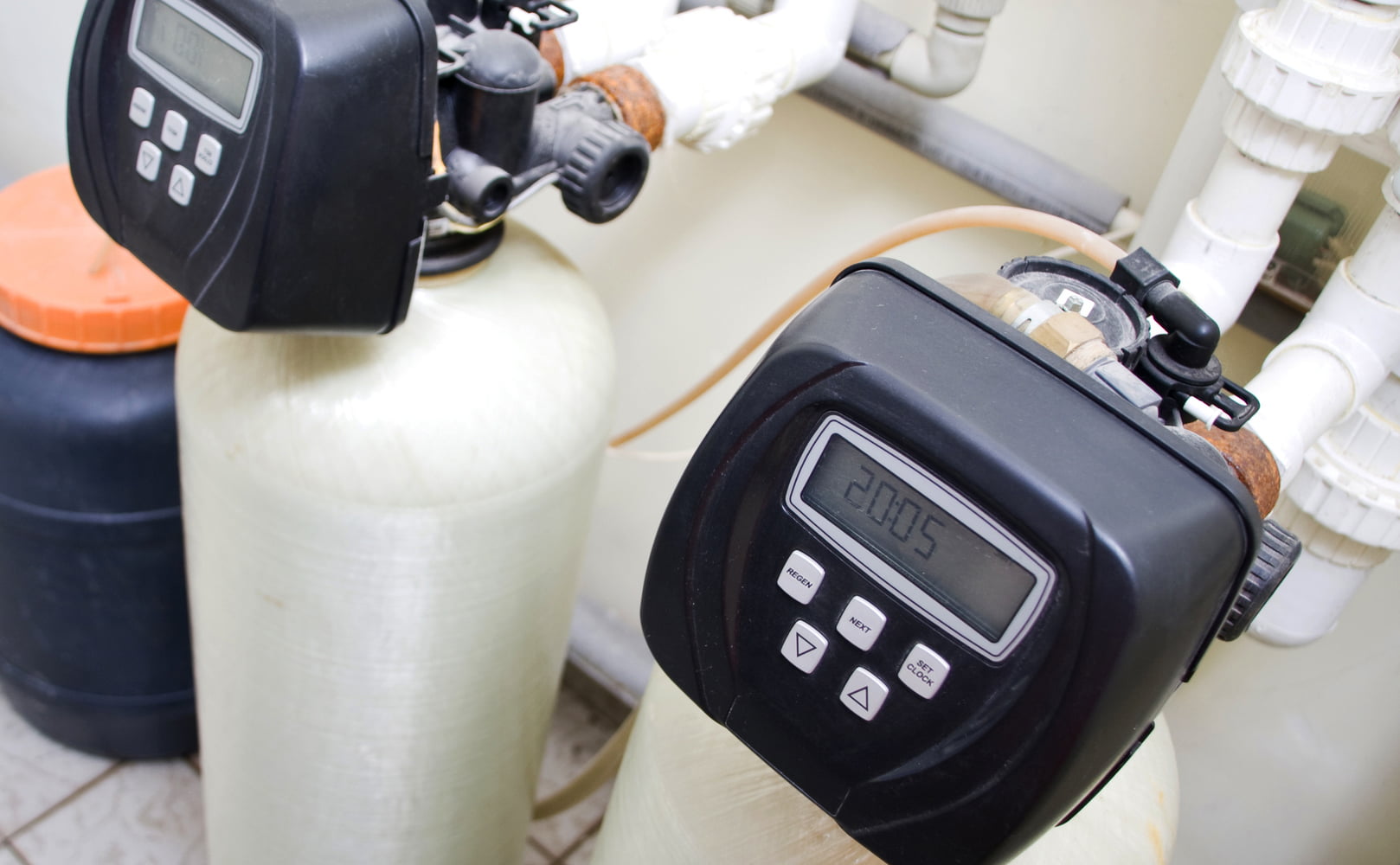5 Best Whole House Water Filter and Salt-Free Softener Combos
Written by: Gene Fitzgerald // Expert Fact-Checking: Buddhini Dolapihilla, MBSS // Last Updated: Jan 31, 2024
This page may contain affiliate links. If you buy a product or service through such a link we earn a commission at no extra cost to you. Learn more.
Top Pick: What’s the Best Whole House Water Filter and Salt-Free Softener Combo?
The best whole house water filter and salt-free water softener combo in 2024 is the SpringWell CSF. It protects your family and home from hard water scaling and contaminants for up to 1,000,000 gallons, improves water aesthetics, is easy to install and maintain, fast (9-20 gpm), and backed by a lifetime warranty and satisfaction guarantee.
Finding the right whole house water filter is difficult. The same goes for finding the ideal salt-free water softener. How hard must it be to choose a whole house water filter and salt-free water softener combo?
Well, we’ve done the research for you. From more than 10 combos, we’ve handpicked the best systems, ensuring that you can enjoy the benefits of clean water that won’t form limescale in your pipes and appliances.
No Time to Read? Check Our List of the Best Water Filter and Salt-Free Softener Combos!
| Product | Details | |
|---|---|---|
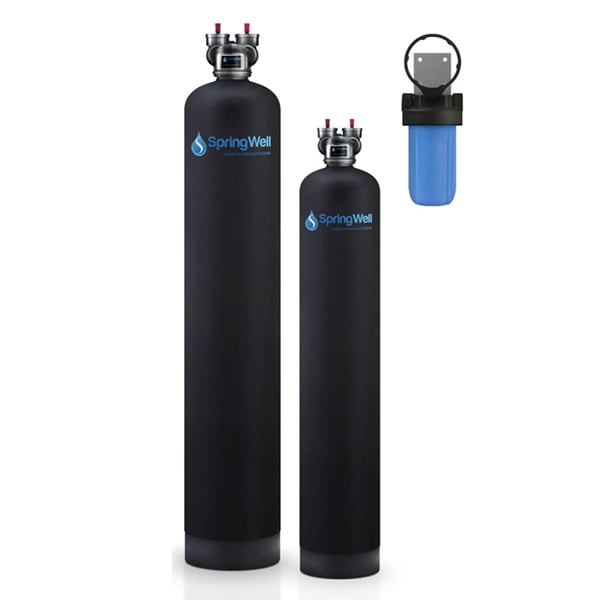 Best for City Water: SpringWell CSF |
Overall Rating: 5.0/5.0 ⓘRatings based on filtration/softening effectiveness and capacity, purchase and annual cost, our testing/experience, support, user feedback, product warranties, and other factors.
Get 5% Off! Use Code: |
Price: $$ Filtration Capacity: 1,000,000 Gallons Softening Method: TAC Water Flow Rate: 9-20 Gallons Per Minute Annual Cost: ~$40 Read Review: Click Mike’s Video Review: Click |
 Best for Well Water: SpringWell WSSF |
Overall Rating: 5.0/5.0 ⓘRatings based on filtration/softening effectiveness and capacity, purchase and annual cost, our testing/experience, support, user feedback, product warranties, and other factors.
Get 5% Off! Use Code: |
Price: $$$ Filtration Capacity: Around 10 Years Softening Method: TAC Water Flow Rate: 12-20 Gallons Per Minute Annual Cost: $0 Read Review: Click |
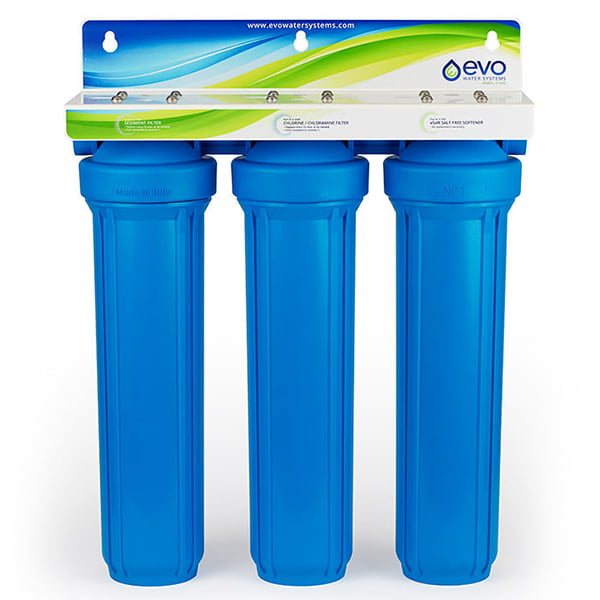 Best for Low Budgets: Kind E-3000 |
Overall Rating: 5.0/5.0 ⓘRatings based on filtration/softening effectiveness and capacity, purchase and annual cost, our testing/experience, support, user feedback, product warranties, and other factors.
Get 5% Off! Use Code: |
Price: $ Filtration Capacity: 1 Year Softening Method: TAC Water Flow Rate: 15 Gallons Per Minute Annual Cost: ~$145 Read Review: Click |
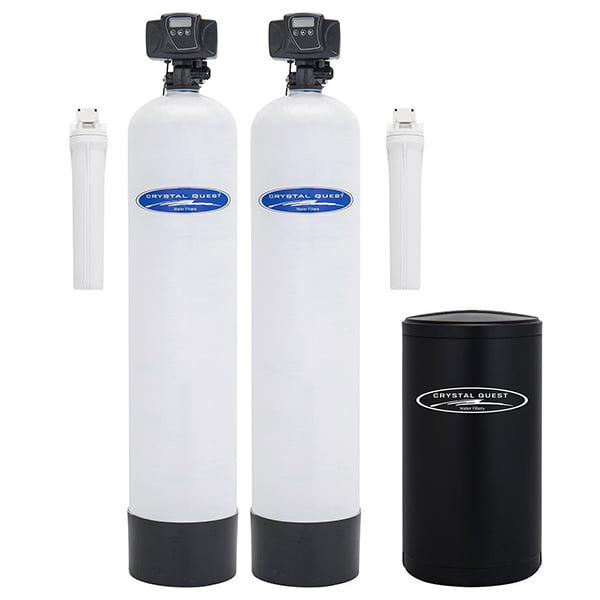 Best for Broad Contaminant Removal: Crystal Quest SMART |
Overall Rating: 4.0/5.0 ⓘRatings based on filtration/softening effectiveness and capacity, purchase and annual cost, our testing/experience, support, user feedback, product warranties, and other factors.
Get 5% Off! Use Code: |
Price: $$$ Filtration Capacity: 1,000,000-1,500,000 Gallons Softening Method: TAC Water Flow Rate: 9-13 Gallons Per Minute Annual Cost: ~$50-75 Read Review: Click |
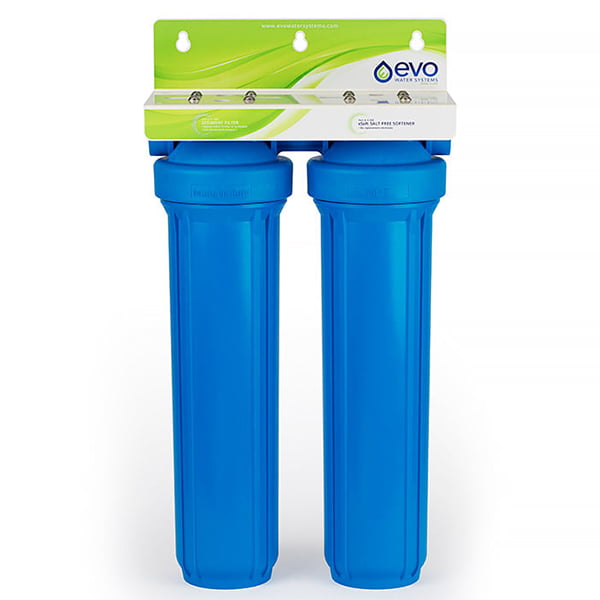 Best for Sediment + Hard Water: Kind E-2000 |
Overall Rating: 5.0/5.0 ⓘRatings based on filtration/softening effectiveness and capacity, purchase and annual cost, our testing/experience, support, user feedback, product warranties, and other factors.
Get 5% Off! Use Code: |
Price: $ Filtration Capacity: 1 Year Softening Method: TAC Water Flow Rate: 15 Gallons Per Minute Annual Cost: ~$35 Read Review: Click |
Whole House Water Filter and Salt-Free Softener Combo Reviews
Our Top Picks
- SpringWell CSF – Best for City Water
- SpringWell WSSF – Best for Well Water
- Kind Water Systems E-3000 – Best Budget Pick
- Crystal Quest SMART – Best for Filtering Various Contaminant Types
- Kind Water Systems E-2000 – Best for Sediment + Hard Water
1. Best Combo for City Water: SpringWell CSF Water Filter and Salt-Free Water Softener
In our opinion, the best whole house water filter and salt-free water softener combo for city water in 2024 is the SpringWell CSF. It provides great-tasting and much healthier water all throughout your home!
Mike’s Video Review
Mike, BOS video content producer, has ordered, installed, and tested both components of the SpringWell CSF for us – including lab testing for contaminant reduction rates. You cannot get more hands-on experience than that! Mike has documented the entire process and shares his opinion the video below:
Gallery
Other Specs
- Model: CSF1, CSF4, CSF+
- Last Price: $2542.52-$4351.86
- Filter Process: Catalytic Carbon, 5-Micron Sediment
- Max Hardness: 81 gpg
- Filter Tank WxHxD: 9-13″x52-58″x9-13″
- Softener Tank WxHxD (with Head): 6-13″x39-58″x6-13″
- Water Temperature: 36-120 °F
- Water Pressure: 25-80 psi
- Water pH: 7-9.5
- Fitting: 1-1.5″
- Warranty: Limited Lifetime
Key Features & Pros
- The SpringWell CSF is a tank-based whole house system with both catalytic carbon and KDF filter media. Catalytic carbon removes chlorine, chloramine, pesticides, herbicides, VOCs, disinfection byproducts, and unpleasant tastes/odors among other stuff. KDF media removes certain heavy metals, further reduces chlorine, and helps prevent the growth of microorganisms inside the tank.
- Chlorine/chloramine reduction is guaranteed to below the minimum detection level for 1 million gallons or 6 years.
- A 5-micron pre or post-filter removes sand, silt, and sediment before it can cause clogging.
- The salt-free water conditioning tank uses catalytic media to crystalize hard minerals like magnesium and calcium. This process converts these minerals to an inert form that can’t cause scale or buildup in your plumbing.
- The softener will even break down older scale buildup inside pipes and appliances with time.
- Suitable for very hard water – up to 81 gpg.
- Up to 99.6% effectiveness.
- No cleaning/regeneration cycle or salt refilling is required. Saves on resources.
- No electricity is required.
- Theoretically, the tank never needs replacement.
- The SpringWell whole house filter and salt-free water softener combo comes in three different sizes:
- CSF1: For homes with 1 to 3 bathrooms. Flow rate of 9 gallons per minute.
- CSF4: For homes with 4 to 6 bathrooms. Flow rate of 12 gpm.
- CSF+: For homes with 7+ bathrooms. Flow rate of 20 gpm.
- The system can also be configured with an optional UV filter stage against microorganisms.
- Tanks come wrapped in neoprene sleeves for added protection.
- Installation can be done on your own provided you have some DIY and plumbing skills.
- Built-in bypass valves.
- Detailed installation instructions and videos are provided.
- Optional installation kit includes 24-inch clack connectors for easy setup.
- The system is essentially maintenance-free other than sediment filter changes every 6 to 9 months. Annual maintenance costs are just $40.
- Limited lifetime warranty on the entire unit.
- 6-month money-back satisfaction guarantee if you’re not happy with the system.
Cons
- Included fittings are plastic rather than metal. These are more prone to developing leaks.
- Salt-free version: Water must be free from iron, manganese, hydrogen sulfide, and copper.
Our Rating
- Filtration/Softening Performance: 5.0/5.0
- Filtration/Softening Capacity: 5.0/5.0
- Price: 4.0/5.0
- Annual Cost: 5.0/5.0
- Overall: 5.0/5.0
Best for
The SpringWell CSF is best for whole house city water treatment.
2. Best for Well Water: SpringWell WSSF Well Water Filter and Salt-Free Water Softener
In our opinion, the best whole house water filter and salt-free water softener combo for well water in 2024 is the SpringWell WSSF. Aside from making your water taste a whole lot better, it eliminates iron and manganese staining all throughout your home and also neutralizes rotten egg smell.
Gallery
Other Specs
- Model: WSSF-1, WSSF-4
- Last Price: $3639.93-$4700.62
- Filter Process: Spin-Down Sediment, Air Injection + Greensand
- Max Hardness: 81 gpg
- Backwash Rate: 5 gpm
- Filter Tank WxHxD: 10-13″x52-54″x10-13″
- Softener Tank WxHxD (with Head): 6-13″x39-58″x6-13″
- Water Temperature: 36-120 °F
- Water Pressure: 25-80 psi
- Water pH: 7-9.5
- Fitting: 1″
- Warranty: Limited Lifetime
Key Features & Pros
- The SpringWell WSSF is another tank-based salt-free whole house filter and softener with both air injection (pre-oxidation) and greensand media to remove ferric and ferrous iron, manganese, and hydrogen sulfide from water. It will also reduce some radium and arsenic.
- Max iron: 7 ppm.
- Max manganese: 1 ppm.
- Max sulfur: 8 ppm.
- Tank uses backwashing to clean itself.
- A sediment pre or post-filter removes sand, silt, and sediment, which protects later filter stages and your home’s plumbing.
- The conditioning tank uses template assisted crystallization (TAC) to convert hardness minerals into inactive crystals that can’t form scale or buildup inside your plumbing or appliances.
- Over 99% scale reduction possible.
- The scale that already existed will dissolve over time.
- Salt-free catalytic media never requires regeneration or replacement which saves on resources.
- The system can handle extremely hard water – up to 81 gpg.
- Two sizes available:
- WSSF-1: 12 gallon per minute flow rate. Can accommodate 1 to 3 bathrooms.
- WSSF-4: 20 gpm flow rate. Can accommodate 4 to 6 bathrooms.
- Both tanks come with protective neoprene sleeves.
- DIY installation is possible provided you have tools and basic DIY/plumbing skills.
- The system comes with bypass valves, an installation kit, and detailed installation instructions.
- The only maintenance required is replacing the sediment filter every 6 to 9 months. Total annual cost is just $40.
- SpringWell offers a lifetime warranty (limited) and a 6-month money-back satisfaction guarantee.
Cons
- Some of the included fittings are plastic rather than metal. These are more prone to leaking/malfunctioning.
- Salt-free combo: Water must be free from Fe, Mn, hydrogen sulfide, and copper.
Our Rating
- Filtration/Softening Performance: 5.0/5.0
- Filtration/Softening Capacity: 5.0/5.0
- Price: 4.0/5.0
- Annual Cost: 5.0/5.0
- Overall: 5.0/5.0
Best for
The SpringWell WSSF is best for homes with hard well water that also require thorough filtration targeting iron, manganese, and/or sulfur.
3. Best Budget Pick: Kind Water Systems E-3000 Whole House Water Filter and Salt-Free Softener Combo
If you are on a budget, the best salt-free water softener and filtration system combo for you is probably the E-3000 by Kind Water Systems.
Gallery
Other Specs
- Model: E-3000
- Last Price: $1,698.30
- Filter Process: Sediment (5-Micron) + Catalytic Carbon Block
- Max Hardness: 75 gpg
- WxHxD: 23¼”x29″x8″
- Water Temperature: 36-120 °F
- Water Pressure: 25-120 psi
- Water pH: 6.5-9.5
- Fitting: 1″ FNPT
- Warranty: Limited Lifetime
Key Features & Pros
- US-made.
- 3-stage cartridge-based system offers thorough treatment at a budget cost.
- The first stage is a 5-micron sediment filter to remove sand, silt, sediment, rust, and clay. This protects the later filter stages as well as your plumbing and appliances from dirt.
- The second stage is a catalytic carbon filter block which will remove chlorine/chloramine as well as many other contaminants commonly found in municipal water: The filter will reduce or eliminate VOCs, THMs, pesticides, herbicides, HAAs, and more.
- This will greatly improve water taste, odor, and healthiness.
- Last up, the salt-free water softener uses template assisted crystallization (just like the 2 SpringWell systems above) to render hardness minerals into harmless micro-crystals.
- The system will also dissolve existing scale buildup over time.
- No maintenance or electricity is required.
- Filter will handle water hardness up to 75 gpg.
- Impressive flow rate of 15 gallons per minute is enough to accommodate 6 bathrooms.
- Installation is simple and can be performed DIY-style provided you have basic skills
- Only 2 connections are required.
- System comes with mounting hardware for both wood and masonry.
- DIY installation does not void the warranty.
- Maintenance is also very simple. The only task necessary is annual filter cartridge changes.
- Annual filter costs total $144.90 or $123.16 if you enroll in auto-ship.
- 6-month money-back satisfaction guarantee plus a lifetime warranty (limited) on the system.
- Kind’s customer service is responsive and helpful.
Cons
- No bypass valve is included with the kit.
- Won’t work for water containing iron or hydrogen sulfide.
Our Rating
- Filtration/Softening Performance: 5.0/5.0
- Filtration/Softening Capacity: 4.5/5.0
- Price: 4.0/5.0
- Annual Cost: 5.0/5.0
- Overall: 5.0/5.0
Best for
The Kind E-3000 is ideal for anyone looking for a municipal water filter/salt-free water softener on a budget.
4. Best Combo for Broad Contaminant Removal: Crystal Quest SMART Whole House Water Filter and Saltless Conditioner
If you don’t want to target a specific type or group of water contaminant but want broad filtration, you should look into the Crystal Quest SMART.
Gallery
Other Specs
- Model: CQE-WH-02178, CQE-WH-02179
- Last Price: $3,630.00-$4,186.00
- Filter Process: Sediment (5 Microns), GAC, Catalytic Carbon, KDF, Ion Exchange Resin, Ceramic Balls, Tourmaline Balls, Carbon Block
- Media Tanks WxHxD: 10-12″x52-54″x10-12″
- Water Temperature: 35-100 °F
- Water Pressure: 20-60 psi
- Fitting: 3/4″ or 1″
- Warranty: 12 Months
Key Features & Pros
- Salt-free whole house water filtration system is Made in USA.
- 5-micron sediment pre-filter removes floating particles to extend the life of the later filter stages.
- The SMART multimedia tank includes:
- Both standard and catalytic granular activated carbon remove chlorine, chloramine, pesticides, herbicides, pharmaceuticals, VOCs, disinfection byproducts, benzene, and more.
- Eagle Redox Alloys (KDF55 and KDF85) to remove heavy metals, additional disinfection byproducts, and hydrogen sulfide (the rotten egg odor commonly found in well water). These alloys also help stop microbial growth inside the tank.
- Ion exchange resin to further eliminate heavy metals and inorganic contaminants.
- Both ceramic and tourmaline balls oxygenate and help achieve a balanced water pH level.
- The salt-free conditioning tank changes hardness minerals like calcium and magnesium into stable nano-crystals that are rinsed away without forming limescale.
- The existing buildup will dissolve over time.
- No backwashing, adding salt, or maintenance is required.
- Minerals are not removed from the water, so you’ll still receive their health benefits.
- Two sizes are available:
- CQE-WH-02178: 1-million-gallon capacity, 9 to 11 gallon per minute flow rate – for home with 1 to 3 bathrooms.
- CQE-WH-02179: 1.5-million-gallon capacity, 10 to 13 gallon per minute flow rate – for homes with 4+ bathrooms.
- A 5-micron carbon block post-filter removes any remaining contaminants and gives the water a final polish.
- The fiberglass tank casing can be upgraded to stainless steel if desired.
- Installation is more complex than other whole house systems. That’s due to the additional filter stages.
- Detailed installation instructions are provided online.
- DIY installation is possible but not recommended if you don’t have experience.
- Maintenance is simple, with only pre and post-filter cartridge replacements every 12 to 18 months. The annual cost for filters comes to just $50 to $75.
- 1-year warranty on the system.
Cons
- A bit more expensive when compared to the other systems that are part of this review.
- Water may require pre-treatment if it contains significant levels of manganese, iron, copper, hydrogen sulfide, or phosphate (all of which are common in well water).
Our Rating
- Filtration/Softening Performance: 4.5/5.0
- Filtration/Softening Capacity: 5.0/5.0
- Price: 3.0/5.0
- Annual Cost: 5.0/5.0
- Overall: 4.0/5.0
Best for
The Crystal Quest SMART filter-softener combo is best for anyone requiring thorough and broad-based contaminant removal plus salt-free water conditioning.
5. Best for Sediments + Hard Water Only: Kind Water Systems E-2000 Whole House Water Filter and Conditioner
If you are on a budget and all you want to remove are sediments and hard water scaling, the Kind E-2000 whole house water filter and conditioner might be the perfect fit…
Gallery
Other Specs
- Model: E-2000
- Last Price: $1,074.23
- Filter Process: 5-Micron Sediment
- Max Water Hardness: 75 gpg
- WxHxD: 15.5″x29″x8″
- Water Temperature: 36-120 °F
- Water Pressure: 25-120 psi
- Water pH: 6.5-9.5
- Fitting: 1″ Female NPT
- Warranty: Lifetime (Limited)
Key Features & Pros
- This 2-stage whole house water filter and salt-free softener combo features a 5-micron pleated pre-filter as well as a template-assisted crystallization stage for hard water conditioning.
- The 20” pleated sediment filter will remove sand, silt, sediment, and rust. This protects the later filter stage from clogging as well as your water-consuming appliances.
- The eSoft cartridge changes calcium and magnesium into a harmless crystal form. This not only prevents limescale from developing but also dissolves old limescale deposits.
- The max hardness level is 75 gpg.
- No regeneration, refilling, or maintenance is required.
- The system has an impressive 15-gallon per minute flow rate – enough for homes with 1 to 6 bathrooms.
- Installation is simple and easy, requiring only 2 plumbing connections. Mounting hardware comes included with the kit.
- The only maintenance required is changing the pre-filer annually. This costs just $30 to $35 per year or 15% less if you enroll in auto-ship.
- Lifetime warranty on the system plus a 6-month money-back satisfaction guarantee.
- Quick delivery and responsive customer service.
Cons
- The system won’t work with any sulfur or iron in the water (common in well water systems).
Our Rating
- Filtration/Softening Performance: 5.0/5.0
- Filtration/Softening Capacity: 4.5/5.0
- Price: 4.0/5.0
- Annual Cost: 5.0/5.0
- Overall: 5.0/5.0
Best for
The Kind E-2000 is best for anyone on a tight budget who wants whole house sediment filtration plus salt-free conditioning.
- Best Whole House Water Filter and Water Softener Combos
- Best Whole House Well Water Filtration and Softener Systems
- Best Whole House Water Filtering Systems
- BOS Reviews: The Best Whole House Hard Water Filters
- Best Saltless Water Softener Reviews 2024
- The Best Water Conditioner System Reviews (2024)
- Here Are the Best Systems to Soften Your Water!
- List with All Whole House Water Filters Featured on BOS
- List with All Water Softeners Featured on BOS
Comparison List
(Mobile Hint: Swipe to Scroll)
| Model | Price | Filtration | Filter Life | Softening Tech | Max Hardness | Flow Rates | Yearly Cost | Warranty | Additional Info |
|---|---|---|---|---|---|---|---|---|---|
| SpringWell CSF Whole House City Water Filter + Salt-Free Water Softener Combo | $$ | Catalytic Carbon, Sediment | 1 Million gal | Template Assisted Crystallization | 81 Grains Per Gallon | 9-20 gpm | ~$40 | Lifetime (Limited) | |
| SpringWell WSSF Whole House Well Water Filter + Salt-Free Water Softener Combo | $$$ | Spin-Down Sediment, Air Injection + Greensand | About 10 Years | Template Assisted Crystallization | 81 Grains Per Gallon | 12-20 gpm | – | Lifetime (Limited) | |
| Kind Water Systems E-3000 Whole House Water Filter and Salt-Free Softener Combo | $ | Sediment + Catalytic Carbon Block | 12 Months | Template Assisted Crystallization | 75 Grains Per Gallon | 15 gpm | ~$145 | Lifetime (Limited) | |
| Crystal Quest SMART Whole House Water Filter and Saltless Conditioner | $$$ | Sediment, GAC + Catalytic Carbon, KDF, Ion Exchange, Mineral Balls, Carbon Block | 1-1.5 Million gal | Template Assisted Crystallization | ? | 9-13 gpm | ~$50-75 | 1 Year | |
| Kind Water Systems E-2000 Whole House Water Filter and Conditioner | $ | Sediment | 12 Months | Template Assisted Crystallization | 75 Grains Per Gallon | 15 gpm | ~$35 | Lifetime (Limited) |
Buying Guide: How to Choose the Salt-Free Water Softener and Filtration System Combo That’s Best for You
The following are key features worth considering when shopping for a salt-free water softener and filter combo. They will help you choose the right on for your needs and budget.
Test Your Water Quality + Parameters
The first thing you want to do before considering any water treatment system is determine which contaminants and impurities you’ll need to deal with. The only surefire way to do this is to have your water tested.
If your water is supplied by a well, then the best method is sending a sample in for professional lab testing. This will give you precise readings of the chemicals in your water and their quantities. You can also purchase home testing kits, which will give you a rough idea of the contamination in your water but probably won’t provide precise quantities.
If your water is supplied by a municipality, several publicly available utilities can give you a good idea of the contaminants/impurities in your water. Check out the EWG database or the EPA database for more info.
Whole House Water Filter Type (Filter Media)
Filter media differ depending on the intended application. Filters can generally be divided into city water filters and well water filters as each one will target different contaminants.
City Water Filters
City water filters will typically be designed to eliminate chlorine/chloramine, disinfection byproducts, possibly sediment, and other substances that impart water with poor tastes and odors or affect your health.
Most of these filters are carbon-based – with either standard activated carbon or catalytic carbon. Catalytic carbon filters have the advantage of eliminating chloramine, a commonly used disinfection agent in municipal water treatment.
Some city water filters will also feature KDF media to reduce some heavy metals and help control microbial growth inside the tank.
You may also find ion exchange resin (for heavy metals, salts, and other ions).
Well Water Filters
Well water filters are designed to remove a different set of contaminants than city water filters. Because well water doesn’t undergo any treatment, chlorine/chloramine is often a non-issue, but elements like hydrogen sulfide, iron, and manganese are.
In order to remove these and other similar contaminants, a well water filter may use some form of pre-oxidation followed by greensand or so. For lower contamination levels, you may be able to skip pre-oxidation.
Carbon filtration is sometimes included to remove chemicals from agricultural runoff etc.
And, of course, sediment filters can be used to trap floating particles.
Salt-Free Water Softener Type (Technology)
After the filtration stage(s), salt-free water softeners are used to neutralize or reduce hard water scaling. There are several variations of salt-free water softeners – with template assisted crystallization being the most powerful.
TAC
TAC – short for template-assisted crystallization – uses catalytic media to convert normal hard minerals into an inert crystallized form. These crystals can no longer form limescale and are essentially harmlessly suspended in the water.
TAC is highly effective at reducing scale buildup – and can prevent over 99% when used correctly.
This method offers the advantage of maintaining the mineral content of your water. That means your water will still contain the essential minerals your body needs.
Electromagnetic
Another salt-free method for reducing scaling is through electromagnetic water conditioners – also called water descalers. These use electricity or plain magnets to change the properties of hardness minerals. The effectiveness of these systems is somewhat limited.
Chelation
Chelation refers to softeners that add chelating agents to water to bond with hardness minerals. The minerals are then unable to form scale on fixtures and appliances. Chelation agents can be citric acid, EDTA, or polyphosphate.
The effectiveness of chelation water softeners is mixed, with some users reporting them as being effective while other users prefer TAC.
Flow Rates
Flow rates refer to the total capacity of the system to process water at one time. This is measured in gallons per minute, with many manufacturers also providing the number of bathrooms the system can provide for.
For larger homes, you’ll typically want to go with a system that has around 15 gpm. Smaller homes can get away with a system with less than 10 gpm.
Keep in mind that too low of a flow rate will result in low-pressure issues when running multiple outlets simultaneously.
Installation & Maintenance
When it comes to installation, most filter/salt-free softener systems can be installed on their own provided you have basic DIY and plumbing skills. Most systems come with detailed installation instructions, so as long as you have the tools and know-how, you’ll be able to perform a DIY install.
If that seems beyond your abilities, you can always hire a plumber or contractor to do the installation for you, but you’ll need to factor in several hundred dollars extra.
When it comes to maintenance, the advantage of salt-free conditioners is that they’re essentially maintenance-free. For tank-based filter systems, the only maintenance typically required is periodic changing of the pre or post-filters. For cartridge-based systems, additional filter changes are necessary – usually once or twice a year.
Space
Don’t underestimate the size of a whole house filter plus a salt-free softener.
For tanked systems, this means two large tanks (plus pre and post-filters). This can take up a significant amount of real estate and may make installation difficult in certain cases.
For cartridge-based systems, you’re looking at significantly less space requirements, which can make these systems a good option when installation space is at a premium.
NSF Certifications
NSF certifications refer to accredited third-party certifications provided by independent testing. These certifications confirm the claims made by the manufacturer, so you can be sure a water treatment system is doing what it claims to.
For chlorine taste and odor reduction look for NSF/ANSI Standard 42. For the reduction of contaminants with ‘health effects’ like harmful bacteria, lead, mercury, radon, and more look for systems certified with NSF/ANSI Standard 53.
That said, NSF certification of whole house water filters is extremely rare. And there doesn’t even exist a standard for saltless water conditioning.
Cost
Combinations of whole house water filters and salt-free water softeners aren’t cheap, but that doesn’t mean you can’t find a decent budget system.
In general, cartridge-based systems will be significantly cheaper than tank-based systems but will require annual filter changes. The costs for filter changes will add up over time, so while cartridge systems are much cheaper up front, in the long run, the cost may exceed that of a tanked system.
Either way, it’s important to factor the cost of replacement filters into your calculation when considering any product.
Warranties
Another important consideration when looking at any combo is the warranty. This is especially true for more expensive systems costing thousands of dollars.
Many of the best manufacturers will offer lifetime warranties, which is a strong indication that they stand by their products. Many will also offer money-back satisfaction guarantees, allowing you a trial period to test out the product and return it for a refund if you’re unsatisfied.
More on Whole House Water Filter and Salt-Free Water Softener Combos
What Is a Whole House Water Filter and Salt-Free Water Softener Combo?
A water filter and salt-free water softener combo is a whole house system that combines some form of filtration with salt-free water softening. This results in a setup that will remove contaminants as well as reduce hard water scaling without the use of salt.
These systems can either be cartridge-based or tank-based and feature filtration targeted towards either well water or city water.
What Are the Pros of Water Filter and Salt-Free Softener Combos?
- Space-saving: As salt-free conditioners don’t require a brine tank, they’re significantly more space-saving when compared with salt-based water softeners.
- Water-saving: As regeneration of the filter media isn’t required, you’ll save significant water by going with a salt-free conditioner.
- Low maintenance: As no regeneration, refilling of the brine tank, or brine tank maintenance is required, these systems are remarkably low maintenance.
- Healthy minerals: Unlike traditional systems, salt-free water softeners don’t remove healthy minerals like magnesium from water.
- No added salt: The lack of added salt is another plus for salt-free conditioners, as added salt can negatively affect the water’s taste.
- Easier to install: The lack of regeneration means no drain tank or drain lines are required. This means easier installation.
- Cheaper operating costs: The lack of regeneration or adding salt means less operating costs.
- Water tastes better: As no sodium is added, the water maintains its natural taste.
- No environmental impact: Little to no water waste, salt discharge, plastic waste, and energy usage.
- Lower utility bills: Your utility bills will be lower due to the more efficient operation of your home’s appliances. Reducing or eliminating scale in your pipes results in longer lifespans both for appliances and plumbing fixtures.
- Safe drinking water: Whole house filtration removes contaminants from every outlet in your home, resulting in safe, clean drinking water.
- Healthy skin and hair: Removing chlorine, chloramine, and other contaminants from every fixture in your home results in healthier skin and hair.
- Better taste and odor: Filtered water usually has a significantly better taste and odor than non-filtered water. Contaminants like chlorine, hydrogen sulfide, and iron negatively affect water’s taste, so removing them is a no-brainer.
- Less plastic waste: If you’re swapping from bottled water to a whole house filter, you’ll be generating significantly less plastic waste, which is great for the environment. You’ll also safe money doing so!
Salt-Free Water Softener and Filtration System Cons
- Cost: Whole house filter/softener systems aren’t exactly cheap, so you’ll need to be prepared to shell out some money upfront.
- Space: While salt-free softeners take up less space than salt-based units, a filter-softener combo still takes up a significant amount of space – especially tank-based systems.
- Less effective than salt based-softeners: While salt-free softeners have several distinct advantages, they’re generally less effective at eliminating hard water problems.
- Soft-feeling water: Salt-free softeners don’t produce soft-feeling water.
- Not removing hardness minerals: Salt-free softeners don’t remove hardness minerals, rather they convert them to a different form where they can’t create scale buildup. This means certain issues like laundry fading in color persist.
- Unnecessary filtration: Whole house filters treat all of the water coming into your home, which means in some cases you’ll be filtering water that doesn’t need filtration.
Frequently Asked Questions (FAQ)
- Do salt free water softeners really work?
Yes, they work. However, they work differently from traditional salt-based water softeners. Salt-free systems only reduce the scaling effects of hard water without actually removing any hardness minerals. - What is the difference between a whole house water filter and a salt-free water softener?
A whole house water filter filters water removing contaminants in order to improve its overall quality. A salt-free water softeners only conditions the water so that it doesn’t cause scaling. - Do I install a whole house water filter before or after a water softener?
In almost all cases, a whole house water filter should go before the water softener. - How long will my water filter-softener combo last?
It depends on the combination in question, but you can easily expect a 5 to 10-year lifetime. - How often will I need to change filters?
This also depends on the filters used. Cartridge-based system usually require annual filter replacements. A tank-based whole house water filter may last up to 10 years without maintenance.
How We Chose and Tested the Best Water Filter and Salt-Free Softener Combos (Why Trust Us)
Here’s a sneak peek into our kick-ass methodology we used for reviewing whole house water filter and salt-free water softener combos:
- We came up with a list of attributes, more than 20 in total, to measure all products against, because we’re thorough like that.
- They are rare, but we searched the internet for what feels like every damn combo out there. Seriously, we ended up with over 10 of those bad boys.
- We dug into product manuals, descriptions, certifications, and warranties. We even interviewed some brands to grill them like a bunch of potential customers. We wanted to see if they could handle the heat. We sifted through feedback and ratings from real users on different platforms. We weeded out the fakes like a champ. After this intense process, we were left with less than 7 setups. Only the best of the best made the cut, baby.
- We didn’t stop there. We actually got our hands dirty and ordered/installed some of these setups on a real water supply. After following the manufacturer instructions regarding setup carefully and taking note of the process, we tested everything from how these systems work and filtered water taste & odor to the reduction of existing limescale in pipes. We let those filters do their thing for several weeks – attention to detail is our middle name.
- We even conducted our own lab testing. We’re talking real-life contaminant reduction rates here, folks, as well as water hardness levels, pH, etc.
- Finally, we took all this juicy information, transformed it into bite-sized insights, and presented it to you in a pros vs cons format. We wanted to make it easy for you to make an informed buying decision.
Side note: We ain’t biased. All the information and ratings we present here are independent and trustworthy. We’ve got professionals fact-checking our content to ensure accuracy. The evaluation of NSF and other certifications was assigned as a significant responsibility to Buddhini Dolapihilla, MBSS.
About Our Ratings
Currently, our evaluation of whole house water filter and salt-free softener combos is mostly based on these key factors: Reduction of contamination and limescale formation (25%), service life (20%), flow rates (20%), upfront and long-term cost (15%), hands-on experience and user ratings (10%), product support and warranties (10%).
We’ve rated each combo on a score of 1 to 5, with 5 being the highest rating.
Questions? Ask away!
Information provided on BOS is for educational purposes only. The products and services we review may not be right for your individual circumstances.
We adhere to strict editorial guidelines. Rest assured, the opinions expressed have not been provided, reviewed, or otherwise endorsed by our partners – they are unbiased, independent, and the author’s alone. Our licensed experts fact-check all content for accuracy. It is accurate as of the date posted and to the best of our knowledge.


